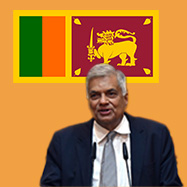India-Sri Lanka Fishermen Issue: An Indian Perspective
Associate Fellow, Manohar Parrikar IDSA, Dr Gulbin Sultana’s chapter, ‘India-Sri Lanka Fishermen Issue: An Indian Perspective’, has been published as part of the book ‘Geopolitics of India-Sri Lanka Relations: The Way Forward, KDU Press: General Sir John Kotelawala Defence University, Ratmalana, 2023, edited by Asantha Senevirathna.








